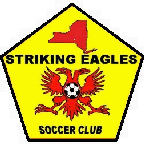Rule No. 1: Keep POSITIVE support,
encouragement, cheer leading and general screaming and hollering to a MAXIMUM on the
touchlines.
When the players are working hard, they need and deserve everyone's best
POSITIVE encouragement and support. They need to know you're there and that their effort
is appreciated. Most teams have a tough enough time developing a sense of teamwork and
achievement at the same time the players are gaining experience and skill. They DO NOT
need to hear YOUR anxiety piled on top of their own when the game is going poorly. If you
really want to make things worse, crank your voice up a few notches and shout "Get it
outta there!"
Rule No. 2: DO NOT CRITICIZE referees or players of either team for any
reason.
If the referees really ARE doing poorly, they may get angry or offended
by critical spectators and that may make things tougher for the team. If they are good at
what they do, they will ignore you, or perhaps ask you to leave the field. Either
situation is at best distracting and at worst reflects poorly on the team's overall
sportsmanship.
Publicly criticizing players on your team can really hurt team morale.
They will already have an EXCELLENT idea what their weaknesses are from their coaches and
teammates. They will not need reminders from their families, friends and other spectators.
The players for the other team are also trying hard and in truth are
probably no meaner or nastier than players from your team. Criticism is simply poor
sportsmanship and leads to unnecessary bad feelings on and off the field. The unfortunate
spectacle of a supposed adult shouting insults at a child on a soccer field is merely
disgusting. Soccer is a game, not a war.
Rule No. 3: Don't coach players from the touchlines, or for that matter
while THEY are on the touchlines.
In most leagues, coaching from the sidelines is frowned on, and rightly
so. Soccer is different from most sports in the US, because it is a game of the players.
Coaches are supposed to intrude as little as possible.
If you feel a child is not doing what should be done, tell the coaches,
not the player. As parents occasionally discover, a player may be doing EXACTLY what the
coaches have instructed. Either way, a parent can help a player's athletic development
much better working together with the coaches, not independently.
Rule No. 4: Give the players, coaches and referees room to work.
Many organizations have rules which require that spectators on the
touchlines stay in an area between the penalty boxes, and keep all parts of their bodies
(even outstretched feet) at least one yard behind the touchline. Do not crowd the
touchlines for any reason and stay away from the goal area to avoid interfering with those
involved in the game.
Rule No. 5: Remember, IT'S ONLY A GAME.
Don't forget, YOUR attitude on the touchlines can affect the mood and
success of the team. If the coaches think that your touchlines activity is hurting team
performance in any way, they should promptly advise you, hopefully without ruffling any of
your feathers. Be tolerant. Emotions run high during games, and feelings are easily hurt.
Nevertheless, any spectator, whether parent, friend or player, who
persists in inappropriate touchlines behavior after being warned by the coaches should be
asked to leave the vicinity of the field. Coaches should not argue with parents at the
game. If YOU want to talk about the game, call the coaches later at home or get them aside
after the game.
Editor's Note: I found this letter on the Web somewhere
long before I had this home page. I don't remember who wrote it or where exactly I got it.
If anyone knows where it came from, please send me a note and I will give credit where
credit is due.
